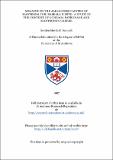Meaning in the allegories painted by Mantegna for Isabella d'Este : a study in the context of Gonzaga patronage and Mantegna's career
Abstract
This Thesis attempts to demonstrate that the themes behind Andrea Mantegna's Parnassus and The Triumph of Virtue drew mainly upon the more arcane aspects of astrology and the cosmos that were dealt with by Marsilio Ficino and by Pico della Mirandola,and which were incorporated into the invenzione drawn up by Paride da Ceresara for the paintings. The examination of the relevant passages from Ficino's translations and editions of the Corpus Hermeticum and of the Asclepius, and from Pico della Mirandola's Conelusiones Magicae and Conelusiones Cabalisticae indicates that Mantegna has depicted two symbolic worlds and that the enlightened soul passes from the lower earthly state shown in The Triumph of Virtue to the higher Ogdoadic state presented in the Parnassus. For the invenzioni, paride de Ceresara grafted the main Hermetic-Cabbalistic theme with congenial literary sources, both contemporary and from the Antique. It is especially the case that aspects of Ciceronian rhetoric played a crucial role in reconciling and satisfying the strategic and inventorist tendencies in Isabella d'Este's thought. Thus it was that the paintings were meant to be read conjointly as a fluent visual essay in Hermetic-Cabbalistic teaching, clothed in an all' antica guise. Throughout this Thesis the approach has been that of an examination of the states of mind of Mantegna, of his Gonzaga patrons and especially that of Isabella d'Este. A comprehensive selection of primary documents has been important in this matter. The Parnassus and The Triumph of Virtue are the result of the mental approach of Mantegna, Paride da Ceresara and Isabella d'Este, with Mantegna displaying his skill and experience in portraying conflated ideas through visual compositions of gestural subtlety using motifs of authentic Antique origin.
Type
Thesis, MPhil Master of Philosophy
Collections
Items in the St Andrews Research Repository are protected by copyright, with all rights reserved, unless otherwise indicated.

